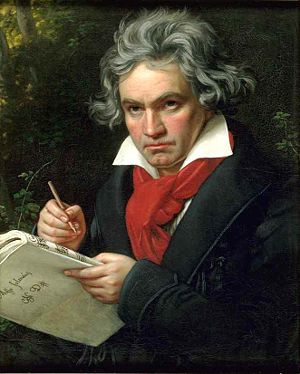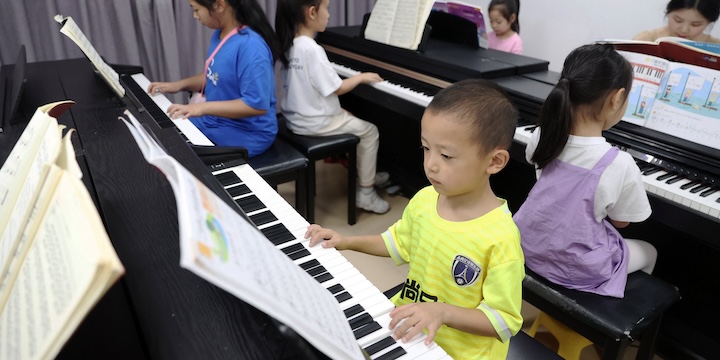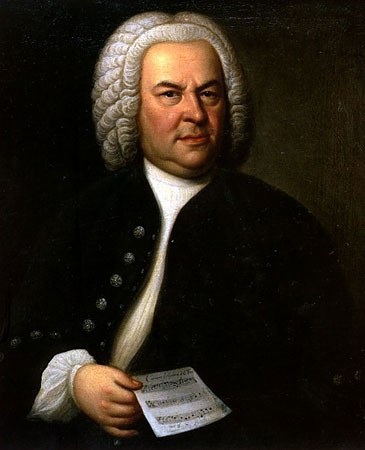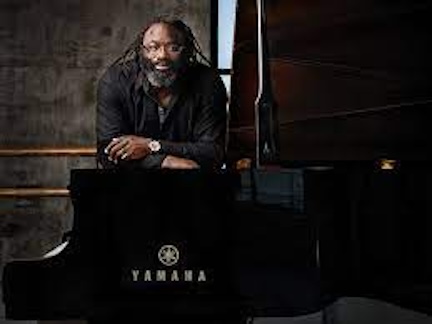The Well-Tempered Ear
Beethoven’s Ninth turns 200 today
2 Comments
PLEASE HELP THE EAR. IF YOU LIKE A CERTAIN BLOG POST, SPREAD THE WORD. FORWARD A LINK TO IT OR, SHARE IT or TAG IT (not just “Like” it) ON FACEBOOK. Performers can use the extra exposure to draw potential audience members to an event. And you might even attract new readers and subscribers to the blog.
By Jacob Stockinger
Perhaps the only symphony more iconic than Beethoven’s Ninth is the Fifth Symphony by the same composer (below).
But today we celebrate the premiere of the pioneering Ninth Symphony that took place 200 years ago on May 7, 1824. Below is the original poster announcing the concert program with the premiere, which Beethoven conducted in his total deafness.
Here is a link to an anniversary story, with lots of historical background about the original performance, by the PBS affiliate WETA in Washington, D.C.:
https://weta.org/fm/classical-score/may-7-1824-200th-anniversary-premiere-beethovens-symphony-no-9
The 70-minute-long Ninth — also called the “Choral” Symphony — is a remarkable work in so many ways. It remains perhaps the most universal music ever written, meaningful to many different individuals and cultures.
Unlike most symphonies of the time, the opening does not immediately announce a theme. It seems to drift around until it finds a solid key and recognizable theme and rhythm. And then it takes off. It reminds The Ear of the depiction by Haydn, Beethoven’s teacher, in his oratorio “The Creation.”
The New York Times also has an essay by Daniel Barenboim about the meaning of Beethoven’s Ninth. No doubt that would be interesting and enlightening to read. But unfortunately the Times hides it behind a pay wall. Only subscribers get to see it right now.
Instead, here is a comprehensive look in Wikipedia:
https://en.wikipedia.org/wiki/Symphony_No._9_(Beethoven)
The famous choral setting of German poet Friedrich Schiller’s 1785 “Ode to Joy” of the last movement is also the official hymn of the European Union. This was the first use of a chorus in a symphony but would not be the last.
In Japan, the same “Ode to Joy” is sung en masse with a chorus up to 10,000 in stadiums every New Year’s Day and on other special occasions, as you can see in the YouTube video at the bottom, an event that took place after a horrendous earthquake and tsunami. The idealistic music embodies the journey from despair to hope, and to brotherhood and solidarity with all people and all nations.
Leonard Bernstein directed it in Berlin to mark the fall of the Berlin Wall and the coming of German reunification.
As its theme, the nightly Huntley-Brinkley New Report on NBC used to use the percussive, pounding, rhythmically propulsive Scherzo movement — which is The Ear’s favorite movement.
The Ear also thinks that the soulful slow movement has strong suggestions of the lovely and well-known slow movement of Beethoven’s earlier “Pathétique” piano sonata. But it doesn’t seem to have been used as a theme or in a movie soundtrack. Does anyone know differently?
What does the Ninth Symphony mean to you?
What do you think of the Ninth and how do you rank it among other symphonies?
Do you have a favorite recording or performance?
What is your favorite movement of Beethoven’s Ninth?
What other uses of The Ninth do you know of?
The Ear wants to hear
Tags: #ClassicFM, 1824, 2024, America, American, Android, anniversary, anthem, Apple, Arts, Asia, asian, audience, Beethoven, Beethoven's Fifth, Beethoven's Ninth, Berlin Wall, Bing, blog, Broadcast, brotherhood, CD, celebrate, chaos, China, Chinese, choral music, Choral Symphony, chorus, Classical, Classical music, Compact Disc, composer, Concert, conductor, culture, Daniel Barenboim, deaf, deafness, depair, different, disability, drift, duckduckgo, earthquake, en masse, European Union, Facebook, fampus, favorite, Fürtwangler, fifth, film, Friedrich Schiller, German, Germany, Google, Google Alert, Google Alerts, Google Search, Haydn, hearing disabled, hope, Huntley-Brinkley, hymn, icon, iconic, ideakistic, idealism, individual, Jacob Stockinger, Japan, Japanese, journalism, journalist, key, Korea, Korean, Leonard Bernstein, link, Ludwig van Beethoven, Madison, Madison Symphony Orchestra, May 7, mean, meaning, Microsoft, Microsoft Bing, movement, movie, Music, NBC, New Year's Day, New York Times, news, ninth, Ode to Joy, official, opening, oratorio, Orchestra, original, OS, pathetique, Pathetique Sonata, PBS, perform, performance, Piano, pioneering, poem, Poetry, Poster, premiere, program, propulsive, recording, remarkable, report, reunification, rhythm, Romantic, Safari, Scherzo, share, solidarity, soloist, Sonata, soul, soulful, soundtrack, South Korea, South Korean, stadium, Student, suggestion, symphony, tag, take off, takeoff, Teacher, Television, The Creation, The Ear, The Well-Tempered Ear, theme, tidal wave, today, Toscanini, tsunami, TV, Twitter, U.S., United States, universal, University of Wisconsin-Madison School of Music, University of Wisconsin–Madison, US, use, vocal music, wander, well-known, Well-Tempered, welltempered, WETA, Wikipedia, Wisconsin, WordPress, Wordpress.com, work, X, you, YouTube
Pianist Yuja Wang’s new ‘Vienna Recital’ is another triumph
1 Comment
PLEASE HELP THE EAR. IF YOU LIKE A CERTAIN BLOG POST, SPREAD THE WORD. FORWARD A LINK TO IT OR, SHARE IT or TAG IT (not just “Like” it) ON FACEBOOK. Performers can use the extra exposure to draw potential audience members to an event. And you might even attract new readers and subscribers to the blog.
By Jacob Stockinger
Yuja Wang remains the hottest pianist on the touring concert circuit — and not just for her daring, high fashion clothes and her sensuous legs and arms, and her especially expressive face.
Lang Lang might make more money.
Newcomer Yunchan Lim might inspire more anticipation.
And veterans Martha Argerich and Emanuel Ax might command more authority for their interpretations.
But the supremely talented China-born, U.S.-educated Wang remains in very high critical regard and high popular demand — something that the release just yesterday of her latest album “The Vienna Recital” is sure to sustain and increase.
The recital’s program features an eclectic and somewhat unusual mix of works by Beethoven, Scriabin, Isaac Albéniz, Nikolai Kaspustin and Philip Glass (whose Etude No. 6 you can hear Wang perform in the YouTube video at the bottom.)
The Ear also likes seeing that Wang uses the music through a printed score on what appears to be an iPad.
Here is a link to a rave review by Tal Agam from the The Classic Review that is based in Tel Aviv, Israel:
What do you think of Yuja Wang?
Have you listened to The Vienna Recital?”
What do you think of it?
Do you intend to listen to it?
The Ear wants to hear.
Tags: #BlogPost, #BlogPosting, #FacebookPost, #FacebookPosting, #YouTubevideo, Albeniz, Android, anticipation, Apple, Apple Music, Apple Music Classical, Argerich, arms, Arts, Arturo Márques, Asia, asian, audience, Austria, authority, Autumn, Ax, Beethoven, Bing, blog, born, Brahms, China, Chinese, circuit, Classical music, clothes, composer, Concert, concerto, critic, critical, Curtis Institute of Music, dance, danzón, daring, demand, Deutsche Grammophon, Devil, DG, duckduckgo, eclectic, Education, encore, etude, expressive, face, Facebook, fashion, German, Germany, gifted, Glass, Gluck, Google, Google Alert, Google Alerts, Google Search, hear, high, hot, hottest, Iberia, increase, intermezzo, interpretation, IOS, IPad, Isaac Albéniz, Israel, Jacob Stockinger, Jazz, Kapustin, Korea, Korean, legs, Ligeti, like, Lim, link, listen, Live Recording, Ludwig van Beethoven, melodie, melody, Mexican, Mexico, Microsoft, Microsoft Bing, mix, money, Music, Music education, music review, new, newcomer, Orfeo, Orfeo ed Euridice, OS, People's Republic of Chnia, perform, Philip Glass, Pianist, Piano, popular, PRC, Prelude, prestige, printed, program, rave, recital, recorded music, recording, regard, release, review, Russia, Russian, Safari, Schoenberg, score, Scriabin, sensual, sensuality, sensuous, share, Sonata, South Korea, South Korean, Soviet, Soviet Union, Spain, Spanish, Suite, sustain, tag, talent, talented, technique, Tel Aviv, The Classical Review, The Ear, The Vienna Recital, The Well-Tempered Ear, think, tour, transcription, triumph, Twitter, U.S., United States, unusual, US, use, Veteran, video, Vienna, virtuoso, Wang, Warsaw, Well-Tempered, welltempered, welltemperedear, Wisconsin, Wong, WordPress, Wordpress.com, X, yesterday, you, YouTube, Yuja Wang, Yunchan Lim
Is piano-mania in China fading?
Leave a Comment
PLEASE HELP THE EAR. IF YOU LIKE A CERTAIN BLOG POST, SPREAD THE WORD. FORWARD A LINK TO IT OR, SHARE IT or TAG IT (not just “Like” it) ON FACEBOOK. Performers can use the extra exposure to draw potential audience members to an event. And you might even attract new readers and subscribers to the blog.
By Jacob Stockinger
You have probably heard of piano superstars Lang Lang and Yuja Wang. Maybe even of prize-winners Yundi Li and Haochen Zhang, who both won the Van Cliburn competition while in their teens.
The Ear recently read where there are more piano students in China — the People’s Republic of China — than in Europe, North America and South America combined. In 2019, one music website estimated that “over 40 million Chinese kids are studying the piano today, with some sources going as high as 50 million.”
How did this piano phenomenon come about?
As Bloomberg news recently reported: “China’s love affair with the piano goes back several decades. During the Cultural Revolution of the 1960s, the instrument was condemned as a symbol of the bourgeoisie. But thanks to the economic reforms and the country’s opening up, the piano became an affordable luxury for a quickly expanding middle class.” (Is it a similar story in South Korea, which has produced many outstanding pianists and winners of international competitions?)
That sounds familiar — similar to what happened in Western culture as the middle class expanded and Hausmusik for amateur musicians took hold. It was a time when most middle-class households had a piano. But now that is fading in the West. Check out all the used pianos listed for sale on Craig’s List and other places.
For more detailed background about about the role of pianos and classical music in China, see this 2019 post by Ludwig-Van.com:
But now news reports say China’s economy is headed for hard times.
What does that mean for piano-mania in China?
Maybe the same thing that has happened in Europe and the United States?
Here is an updated story from another source that says the Chinese piano craze is playing itself out:
https://www.sixthtone.com/news/1014703
Do you have an opinion about China and its love affair with pianos and Western music?
About the fate of pianos and piano lessons in the West?
The Ear wants to hear.
Tags: #Middle-Class, affordable, amateur, amateur musicians, Arts, Asia, asian, audience, Bach, Beethoven, blog, Bloomberg, bourgeoisie, Canada, Chamber music, children, China, Chinese, Classical music, Competition, composer, Concert, concerto, Craig's List, craze, Cultural Revolution, economic, economy, Europe, Facebook, fad, German, Germany, Haochen Zhang, hausmusik, instrument, international, Jacob Stockinger, Johann Sebastian Bach, kids, Korea, Korean, Lang Lang, link, Love, love affair, Ludwig van Beethoven, Luwig-Van.com, luxury, Madison, mania, Mozart, Music, music students, news, North America, online, pianists, Piano, piano lessons, post, PRC, reforms, report, share, Sixth Tone, Sonata, source, South America, South Korea, South Korean, symbol, tag, Taiwan, Taiwanese, The Ear, Toronto, United States, University of Wisconsin-Madison School of Music, University of Wisconsin–Madison, used pianos, Van Cliburn, Van Cliburn International Piano Competition, Website, Western culture, Western music, winner, Wisconsin, Yuja Wang, Yundi Li
Solving the beautiful mathematics of Bach
Leave a Comment
PLEASE HELP THE EAR. IF YOU LIKE A CERTAIN BLOG POST, SPREAD THE WORD. FORWARD A LINK TO IT OR, SHARE IT or TAG IT (not just “Like” it) ON FACEBOOK. Performers can use the extra exposure to draw potential audience members to an event. And you might even attract new readers and subscribers to the blog.
By Jacob Stockinger
The music of Johann Sebastian Bach (below) doesn’t just sound mathematical.
It IS mathematical.
And although fugues sound the most overtly mathematical of all Bach’s works, you can find complex mathematical and informational patterns to varying degrees in the preludes (below) and overtures, sonatas and partitas, cantatas and oratorios, concertos, suites and toccatas . (In the YouTube video at the bottom, you can hear pianist and Bach specialist Andras Schiff play the long, complex and sublime Prelude and Fugue in B minor, BWV 869, No. 24 from Book I of the Well-Tempered Clavier.
Here is the link to the story about physicists who solved Bach’s math that was featured in Scientific American:
https://www.scientificamerican.com/article/secret-mathematical-patterns-revealed-in-bachs-music
You can also hear plenty of Bach’s beautifully mathematical music live and online for FREE during the upcoming Bach Around the Clock (BATC) celebration of his birthday in Madison. It will take place March 6-10.
Here is a link to the schedule of performers and repertoire both in live performance and virtually online:
Tags: #BaroqueOratorio, #BlogPost, #BlogPosting, #FacebookPost, #FacebookPosting, #YouTubevideo, 2024, András Schiff, Arts, Bach, Bach Around the Clock, Baroque, BATC, beauty, birthday, blog, BWV, Cantata, celebration, Cello, Chamber music, choral music, Classical music, complex, composer, Concert, concerto, Early music, Facebook, free, French, fugue, German, Jacob Stockinger, Johann Sebastian Bach, link, live, long, Madison, Madison Symphony Orchestra, march, math, mathemarics, mathematical, Music, online, oratorio, Orchestra, partita, performance, performer, physicist, physics, Pianist, Piano, Prelude, repertory, repetoire, schedule, Scientific America, share, Sonata, stream, streamed, study, sublime, Suite, symphony, tag, The Ear, toccata, United States, University of Wisconsin-Madison School of Music, University of Wisconsin–Madison, Viola, Violin, virtual, vocal music, Wisconsin, YouTube
Classical music predictions for 2024
Leave a Comment
SHARE IT or TAG IT (not just “Like” it) ON FACEBOOK. Performers can use the extra exposure to draw potential audience members to an event. And you might even attract new readers and subscribers to the blog.
By Jacob Stockinger
The classical music blogger LudwigVan has made some interesting predictions about where classical music will go in the coming year.
Not all of the subjects might come to pass in classical music.
But many do seem possible or even plausible.
Like ticket prices dropping because of rising post-pandemic demand and tight family and personal budgets.
Or rising wages for musicians because of inflation.
Or the growing use of VR or virtual reality.
Or hearing more local music and musicians that appeal to younger audiences.
See for yourself. Here is a link:
The Ear will venture his own predictions:
First is that more and more audiences — especially the oldest baby boomers — will increasingly watch and listen to concerts via live streaming and recorded streaming.
It certainly is not as exciting as attending in person. But it is convenient. And it is way cheaper. For example, one good ticket to the Madison Symphony Orchestra or the Madison Opera will buy you a one-year unlimited subscription to the Paris-based arts streaming site medici.tv, which features live and recorded performances of all kinds, plus interviews, competitions and master classes, from around the world and especially Europe.
Then there are other factors to consider such as the artists and the programs you want to see and hear, or the inconvenience, expense and dangers of finding parking or navigating icy walking and driving at night and in bad weather.
And The Ear’s second prediction is that Asian musicians, especially Chinese and Korean, will continue to dominate international competitions.
See: https://welltempered.wordpress.com/?s=asian+musicians
Which predictions by Ludwig-Van do you think apply to classical music and are correct?
Do you have your own thoughts or predictions about trends in the classical world?
The Ear wants to hear.
Tags: #BlogPost, #BlogPosting, #FacebookPost, #FacebookPosting, #YouTubevideo, aging, AI, Android, Android (operating system), Apple, Apple Music, Apple Music Classical, artist, artists, Arts, Asia, asian, audience, Austria, Austrian, baby boomers, Bach, bad weather, Baroque, Beethoven, blog, British, budget, Cello, Chamber music, China, Chinese, choral music, Classical music, coming year, composer, Concert, concerto, danger, driving, Early music, Europe, expense, Facebook, Family, feature, finances, France, German, Germany, ice, inflation, international, interviews, Italian, Italy, Japanese, Korea, Korean, live streaming, local, local musicians, Ludwig-van, LudwigVan, Madison Opera, Madison Symphony Orchestra, master class, media, medici.tv, Mozart, Music, New Year, oldest, opera, Orchestra, Overture Center, pandemic, Paris, parking, performer, personal, pianists, Piano, plausible, poerformance, possible, post-pandemic, prediction, price, program, rain, recorded music, salary, share, snow, Sonata, South Korea, South Korean, Spotify, streaming, strings, subscription, symphony, tag, thoughts, ticket, UK, United Kingdom, United States, University of Wisconsin-Madison School of Music, University of Wisconsin–Madison, unlimited, Viola, Violin, virtual reality, vocal music, VR, wages, walking, weather, Website, Wind, Wisconsin, Wolfgang Amadeus Mozart, you, your, YouTube
Here are winners of major international music competitions in 2023. What’s next?
Leave a Comment
PLEASE HELP THE EAR. IF YOU LIKE A CERTAIN BLOG POST, SPREAD THE WORD. FORWARD A LINK TO IT OR, SHARE IT or TAG IT (not just “Like” it) ON FACEBOOK. Performers can use the extra exposure to draw potential audience members to an event. And you might even attract new readers and subscribers to the blog.
By Jacob Stockinger
Which young, up-and-coming classical musicians should you keep an eye on during the coming year?
Which ones, if any, will be booked in coming years to performance locally, say, at the Madison Symphony Orchestra, the Wisconsin Chamber Orchestra and the Wisconsin Union Theater; or at the Salon Piano Series; or as a University of Wisconsin Mead Witter School of Music guest artist?
One guide to 2024 and beyond might be to review the winners of the international music competitions held in 2023.
Thanks to The Violin Channel, here is a list of many such winners who may go on to establish more prominent careers. If you click on the names of the competitions, posted in red, you will be linked to fuller stories about the competitions, many of which you have probably never heard of. The Ear follows many contests but had never heard of many of these.
Here is a link:
You can find out about histories of the competitions, other prize winners, places they are held and how often, jury members and contest rules and formats, and more. And you can hear excerpts from some prestigious competitions including the Bischoff Chamber Music competition and a competition for young child prodigy violinists in Italy.
At the bottom of the story, you can hear a YouTube video with the 19-year-old, Asian-American pianist Magdelena Ho in her contest-winning performance of Beethoven’s Piano Concerto No. 4 at the Clara Haskil Competition in Switzerland. She looks to have a promising future.
The winners came all continents — Asian, Africa, North America, South America and Europe.
And the competitions were held in many different places and focused on many different kinds or genres of classical music: violin, viola, cello, double bass and guitar; piano; saxophone;mharp; percussion and drums; chamber music and symphonic music; conducting; singing; and early music.
At the bottom is a vibrant performance of a familiar Bach suite by Canadian cellist Luka Coetzee who won Finland’s Paulo Competition and also took first prize at the Pablo Casals Competition on 2022.
Tags: #BlogPost, #BlogPosting, #FacebookPost, #FacebookPosting, #Up-and-Coming, #YouTubevideo, 2023, 2024, Africa, African, America, American, Android, Ann Arbor, Apple, Arts, Asia, asian, audience, Bach, Baroque, Beethoven, Bischoff, blog, Bonn, Boston, brass, Canada, Canadian, Cello, Chamber music, Child, children, China, Chinese, choral music, Clara Haskil, Classical, Classical music, composer, Concert, concerto, conductor, continent, contralto, double bass, drums, Early music, Europe, Facebook, Finland, Finnish, format, France, French, future, genre, geography, German, Germany, Google, guest artist, guitar, Hanover, harp, History, Ho, international, Italian, Italy, Jacob Stockinger, Johann Sebastian Bach, Kim, kind, Korean, Leonid Kogan, link, Ludwig van Beethoven, Mac, MacBook, Madison, Madison Symphony Orchestra, Massachusetts, Mead Witter School of Music, Michigan, Mozart, Music, music competition, Musician, North America, opera, Orchestra, OS, Overture Center, PC, Penderecki, percussion, perform, performance, Pianist, Piano, Poland, Polisy, prize, prodigies, prodigy, Romania, Romanian, rules, Russia, Russian, Salon Piano Series, Saxophone, Serge Koussevitsky, share, singer, Singing, Sonata, song, soprano, South Africa, South African, South America, South Korea, South Korean, stream, strong, study, Suite, Swiss, Switzerland, symphony, tag, Teacher, The Ear, U.S., United States, University of Wisconsin-Madison School of Music, University of Wisconsin–Madison, UW, UW-Madison, Viola, Violin, Violin Channel, violinist, violist, vocal music, Wee, win, Wisconsin, Wisconsin Chamber Orchestra, Wisconsin Union Theater, Wolfgang Amadeus Mozart, won, year, young, young artists, YouTube
Remembering the classical musicians who died in 2023
3 Comments
PLEASE HELP THE EAR. IF YOU LIKE A CERTAIN BLOG POST, SPREAD THE WORD. FORWARD A LINK TO IT OR, SHARE IT or TAG IT (not just “Like” it) ON FACEBOOK. Performers can use the extra exposure to draw potential audience members to an event. And you might even attract new readers and subscribers to the blog.
By Jacob Stockinger
It remains an end-of-the-year ritual: remembering the dead who brought beauty to us through music.
Here are remembrances of the classical musicians we lost in 2023.
From Presto Music comes a list of world-known talents who died this past year — plus those who died in recent past years. It is relatively short and has links to the full obituaries, including the of American mezzo-soprano Grace Bumbry (below, in 2009, in the singing the famous Habanera from Bizet’s “Carmen” in the YouTube video at the bottom). A pioneer, she was the first Black singer to perform at the annual summer Wagner festival in Beyreuth, Germany, and she performed at the Wisconsin Union Theater during the 1978-79 season:
https://www.prestomusic.com/classical/articles/obituary/browse
Here is a longer, less renowned and more international list from The Violin Channel.
It includes many very well known musicians, including Menahem Pressler (below who co-founded and played for more than 50 years with the Beaux Arts Trio, which performed several times at the Wisconsin Union Theater. He also taught at the Indiana University Jacobs School of Music.
It also includes the jazz and classical bassist Richard Davis (below), who spent decades teaching and performing at the University of Wisconsin-Madison Mead Witter School of Music.
The Ear especially likes this list because ordinary “house” musicians — and not just stars — are remembered. After all, the majority of musicians who add so much to our lives are not stars — but usually just mainstream workers in the arts.
Click on the names in red to see the full biographies, many of which are more touching than you might expect — for example, the Ukrainian conductor who died young while defending his country against Russia.
Tags: #BlogPost, #BlogPosting, #FacebookPost, #FacebookPosting, #YouTubevideo, 2023, African American, America, American, André Watts, Android, Apple, aria, Arts, Asia, asian, audience, Austria, Bach, baritone, Baroque, bass, Bayreuth, beauty, Beaux Arts Trio, Beethoven, Belgium, Berlin Philharmonic, biographies, Bizet, black, blog, Britain, Carmen, Cello, Chamber music, Choir, choral music, Classical, Classical music, Colombia, composer, Concert, concerto, conductor, Czech, Czech Republic, dead, death, dying, Early music, end, England, English, Facebook, famous, festival, Finland, Finnish, France, Franz Liszt Chamber Orchestra, German, Germany, Google, Grace Bumbry, Greece, Greek, Habanera, Hong Kong, House, Hungary, I Musici, Indiana University, Ingrid Haebler, international, Israel, Italy, Jacob Stockinger, Japan, Japanese, Jazz, Jewish, Johann Sebastian Bach, Kaija Saariaho, know, Korea, Korean, Latvia, life, link, Liszt, lives, Ludwig van Beethoven, Madison, Mead Witter School of Music, meaning, Menahem Pressler, mezzo-sorpano, Mozart, Mozart in the Jungle, Music, Musician, Netherlands, New Year, obituaries, obituary, Oboe, opera, Orchestra, OS, Oscars, Overture Center, passed, passing, perform, performance, performer, performing, Pianist, Piano, Piano Trio, popular, Prague, Presto Music, remember, remembrance, Renata Scotto, Richard Davis, ritual, Romania, Russia, Russian, Sakamoto, Scotland, share, singer, Singing, Sonata, South Korea, South Korean, star, String quartet, strings, summer, symphony, tag, teach, Teacher, tenor, The Ear, Turkey, Turkish, U.S., UK, Ukraine, Ukrainian, United States, University of Wisconsin-Madison School of Music, University of Wisconsin–Madison, UW, Viola, Violin, Violin Channel, vocal music, Wagner, winds, Wisconsin, Wisconsin Union Theater, woodwinds, worker, working, year, YouTube
NPR names the Top 10 classical recordings of 2023
Leave a Comment
PLEASE HELP THE EAR. IF YOU LIKE A CERTAIN BLOG POST, SPREAD THE WORD. FORWARD A LINK TO IT OR, SHARE IT or TAG IT (not just “Like” it) ON FACEBOOK. Performers can use the extra exposure to draw potential audience members to an event. And you might even attract new readers and subscribers to the blog.
By Jacob Stockinger
Every holiday season, The Ear used to post various lists of the top classical recordings of the year as a kind of gift guide for giving or receiving CDs.
Such lists can still be used that way — especially now that audiophiles have turned to vinyl LPs that are quite expensive as well as limited in choice.
But since so many of us now have streaming services, I view such lists more and a guide to exploring rather than purchasing.
For example I can listen to the first album in 12 years by Awadagin Pratt (below and in the YouTube video at the bottom). It is “Stillpoint” and it features six pieces commissioned by Pratt. By streaming I can decide if I like it without buying it – and getting stuck if I don’t, which is often the case with new music.
Indeed, I think one of the best and most economical gifts one can gift a classical music lover is a trial subscription to a streaming service. For what it is worth, I find Apple Music and Apple Music Classical to be extremely useful and comprehensive in their offerings, including countless out-of-print vintage and outstanding recordings.
But their are several others — including Spotify, Idaho, Presto Music and Qobuz.
Plus, my hunch is that the coming year will bring improvements in offerings and user-friendly listening to all of the streaming services.
In any case, here is the Top 10 list of new recordings from 2023 with numerous YouTube samples and helpful comparisons to other composers and styles of music. It has been compiled by the veteran critic and blogger Tom Huizenga (below) of National Public Radio (NPR):
https://www.npr.org/2023/12/13/1218517774/the-10-best-classical-albums-of-2023
Tags: #BlogPost, #BlogPosting, #FacebookPost, #FacebookPosting, #YouTubevideo, Android, Apple, Apple Music, Apple Music Classical, Arts, Arvo Part, Asia, asian, audience, Audiophile, Awadagin Pratt, Azuri Quartet, Bartok, blog, buy, CDs, Chamber music, China, Chinese, choral music, Classical music, commision, commissioned music, comparison, composer, comprehensive, Concert, concerto, contemporary, contemporary composer, Dante, Debussy, Divine Comedy, Dudamel, economical, Europe, European, Facebook, Finland, Finnish, German, Germany, Google, guide, Gustavo Dudamel, Holiday, Idagio, Jacob Stockinger, Jean Sibelius, Jessie Montgomery, Jessye Norman, Joan Tower, Jonathan Tetelman, Kaija Saariaho, Ligeti, link, Liszt, Lotta Wennäkoski, LPs, Madison, Madison Symphony Orchestra, Mahler, Missy Mazzoli, Monteverdi, Montreal Symphony Orchestra, Music, National Public Radio, New Music, NPR, opera, OS, out-of-print, Piano, Presto Music, Puccini, purchase, Qobuz, Rafael Payare, Raphaël Pichon, Rautavara, recorded music, recording, Richard Wagner, rounds, Saariaho, Season, share, Singing, Sonata, song, soprano, Spotify, Stillpoint, Stravinsky, streaming, style, subscribe, subscription, symphony, T.S. Eliot, tag, tenor, The Ear, Tom Huizenga, United States, useful, user-friendly, vesper, Vespers of 1610, vintage, vinyl, vocal music, year, YouTube, Yuja Wang
20 women composers talk about classical music
2 Comments
PLEASE HELP THE EAR. IF YOU LIKE A CERTAIN BLOG POST, SPREAD THE WORD. FORWARD A LINK TO IT OR, SHARE IT or TAG IT (not just “Like” it) ON FACEBOOK. Performers can use the extra exposure to draw potential audience members to an event. And you might even attract new readers and subscribers to the blog.
By Jacob Stockinger
What do women composers think about themselves, their careers and the place they occupy in the world of classical music?
Here are quotes — with YouTube videos, great vintage still photographs and musical excerpts — by 20 women composers throughout history from Hildegard von Bingen in the Middle Ages to contemporary living composers such as Americans Joan Tower, Missy Mazzoli, Jennifer Higdon and Jessie Montgomery.
That many of the names will seem familiar to many readers is a sign of how the “canon” has expanded in recent years and brought a new appreciation of neglected women composers, many of whom have been completely overlooked but are now featured prominently on concert programs and radio shows.
Mind you, insightful observations and great quotes about sexism, racism, ambition, creativity and history don’t guarantee music of superior quality.
But their music has to be played and listened to before it can be judged.
The Ear found this collection well worth paying attention to by men as well as women, especially young ones pursuing a career in music. Everyone can use a little inspiration and encouragement.
Here is a link to the website based in Hong Kong, China that has the story:
What about Louise Ferrenc or Florence Price?
Barbara Strozzi and Asian women?
Are there other names you would include?
What do you think of the collage of quotes, music and videos?
The Ear wants to hear.
Tags: #BlogPost, #BlogPosting, #FacebookPost, #FacebookPosting, #YouTubevideo, Africa-American, America, American, Amy Beach, appreciation, Arts, Asia, asian, audience, Barbara Strozzi, Baroque, Beethoven, Bettina von Arnim, Black composers, Brazil, Brazilian, British, Canon, careers, Cecile Chaminade, Cello, Chamber music, China, Chinese, choral music, Clara Schumann, Clara Wieck Schumann, Classical music, collage, composer, Concert, concert program, concerto, contemporary, Early music, encouragement, English, equal rights, Ethel Smyth, excerpts, Facebook, familiar, Fanny Mendelssohn, Fanny Mendelssohn Hensel, feminism, feminist, Florence Price, forgotten, France, French, Germaine Tailleferre, German, Germany, Grazyna Bacewicz, Great Britain, guarantee, Hildegard von Bingen, History, Hong Kong, insight, inspiration, Italian, Italy, Jacob Stockinger, Japan, Japanese, Jennifer Higdon, Jessie Montgomery, Joan Tower, judge, Julia Perry, Kassia, Korea, Korean, link, living, Louise Ferrenc, Ludwig van Beethoven, Madison, Madison Symphony Orchestra, Margaret Bonds, Marie Jaëll, Medieval, Middle Ages, Missy Mazzoli, Mozart, Music, music students, neglected, opera, Orchestra, overlooked, Overture Center, PBS, People's Republic of China, performances, performer, photographs, Pianist, Piano, place, play, Poland, Polish, PRC, public television, quality, racisim, Radio, radio show, Rebecca Clarke, Russia, Russian, Sexism, share, singers, Sonata, Soviet, symphony, tag, Television, Teresa Carreño, The Ear, think, U.K., UK, Undine Smith Moore, United States, University of Wisconsin-Madison School of Music, vintage, Violin, vocal music, Wisconsin, wisconsin public radio, Wisconsin Public Television, Wolfgang Amadeus Mozart, women, women composers, world, WORT-FM 89.9, WPR, WPT, young, YouTube
- May 2024
- April 2024
- March 2024
- February 2024
- January 2024
- December 2023
- November 2023
- October 2023
- September 2023
- August 2023
- July 2023
- June 2023
- May 2023
- April 2023
- March 2023
- February 2023
- January 2023
- December 2022
- October 2022
- September 2022
- June 2022
- May 2022
- April 2022
- March 2022
- July 2021
- June 2021
- May 2021
- April 2021
- March 2021
- February 2021
- January 2021
- December 2020
- November 2020
- October 2020
- September 2020
- August 2020
- July 2020
- June 2020
- May 2020
- April 2020
- March 2020
- February 2020
- January 2020
- December 2019
- November 2019
- October 2019
- September 2019
- August 2019
- July 2019
- June 2019
- May 2019
- April 2019
- March 2019
- February 2019
- January 2019
- December 2018
- November 2018
- October 2018
- September 2018
- August 2018
- July 2018
- June 2018
- May 2018
- April 2018
- March 2018
- February 2018
- January 2018
- December 2017
- November 2017
- October 2017
- September 2017
- August 2017
- July 2017
- June 2017
- May 2017
- April 2017
- March 2017
- February 2017
- January 2017
- December 2016
- November 2016
- October 2016
- September 2016
- August 2016
- July 2016
- June 2016
- May 2016
- April 2016
- March 2016
- February 2016
- January 2016
- December 2015
- November 2015
- October 2015
- September 2015
- August 2015
- July 2015
- June 2015
- May 2015
- April 2015
- March 2015
- February 2015
- January 2015
- December 2014
- November 2014
- October 2014
- September 2014
- August 2014
- July 2014
- June 2014
- May 2014
- April 2014
- March 2014
- February 2014
- January 2014
- December 2013
- November 2013
- October 2013
- September 2013
- August 2013
- July 2013
- June 2013
- May 2013
- April 2013
- March 2013
- February 2013
- January 2013
- December 2012
- November 2012
- October 2012
- September 2012
- August 2012
- July 2012
- June 2012
- May 2012
- April 2012
- March 2012
- February 2012
- January 2012
- December 2011
- November 2011
- October 2011
- September 2011
- August 2011
- July 2011
- June 2011
- May 2011
- April 2011
- March 2011
- February 2011
- January 2011
- December 2010
- November 2010
- October 2010
- September 2010
- August 2010
- July 2010
- June 2010
- May 2010
- April 2010
- March 2010
- February 2010
- January 2010
- December 2009
- November 2009
- October 2009
- September 2009
- August 2009
Archives
- 2,491,259 hits
Blog Stats
Recent Comments
| Brian Jefferies on Classical music: A major reass… | |
| welltemperedear on What made Beethoven sick and… | |
| rlhess5d5b7e5dff on What made Beethoven sick and… | |
| welltemperedear on Beethoven’s Ninth turns 200… | |
| Robert Graebner on Beethoven’s Ninth turns 200… |
Tags
#BlogPost #BlogPosting #ChamberMusic #FacebookPost #FacebookPosting #MeadWitterSchoolofMusic #TheEar #UniversityofWisconsin-Madison #YouTubevideo Arts audience Bach Baroque Beethoven blog Cello Chamber music choral music Classical music Compact Disc composer Concert concerto conductor Early music Facebook forward Franz Schubert George Frideric Handel Jacob Stockinger Johannes Brahms Johann Sebastian Bach John DeMain like link Ludwig van Beethoven Madison Madison Opera Madison Symphony Orchestra Mead Witter School of Music Mozart Music New Music New York City NPR opera Orchestra Overture Center performer Pianist Piano post posting program share singer Sonata song soprano String quartet Student symphony tag The Ear United States University of Wisconsin-Madison School of Music University of Wisconsin–Madison Viola Violin vocal music Wisconsin Wisconsin Chamber Orchestra wisconsin public radio Wolfgang Amadeus Mozart YouTube
















